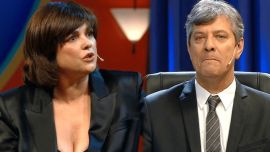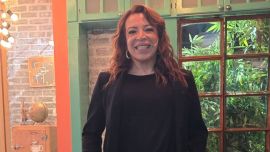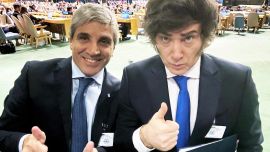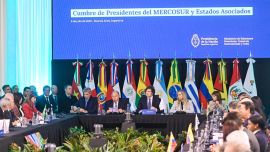Alberto Fernández doesn’t take over as Argentine president until December 10, but how he interacts with outgoing leader Mauricio Macri in the meantime is key to an economy in turmoil. On Monday, at least, the two men were talking.
Fernández arrived at the presidential palace in downtown Buenos Aires without any staff, save for a spokesman. Television networks showed pictures of the men, both in suits, shaking hands before sitting in armchairs facing each other. They met for about an hour over coffee.
Later on Fernandez smiled and waved as he entered a car to leave, but he did not comment.
Even that is a start for what could be a tricky transition period from a market-friendly leader who tried to enact fiscal discipline, to a left-leaning populist who has promised to increase spending for a public tired of the high cost of living and lack of strong public services.
Macri has been grappling with a contracting economy, high inflation, a sliding currency and a tricky debt negotiation with the International Monetary Fund. The economy could be in even worse shape by the time Fernández takes office, so statements of intent to work together in the interim could reassure markets, investors and the public alike.
A surprisingly strong win by Fernández in a primary vote in August spooked markets, with the currency slide that followed forcing Macri to enact capital controls. In the early hours of Monday after Macri conceded the election, Fernández was giving little away.
“Hopefully those who were our opponents during these four years are conscious of what they’re leaving behind and help us rebuild the country from the ashes,” he told supporters at his campaign bunker.
Analysts argue Fernández may need to moderate his rhetoric after Macri’s coalition fared better than expected in congressional races, setting the stage for potential gridlock.
“That implies greater limitations for Alberto Fernandez’s future government,” said Camila Perochena, a political science professor at University of Torcuato Di Tella in Buenos Aires. “The need to reach consensus with the opposition is becoming more evident.”
Investors are waiting for Fernández to unveil his economic team and further clues to his policy direction. His team ranges from traditional economists to unorthodox policy makers. It’s unclear how Fernández will renegotiate Argentina’s $56 billion credit line with the IMF, a deal that’s currently suspended due to policy uncertainty.
“Alberto Fernandez will have little time to find the formula for an economic turnaround,” said Nicolas Solari, director of polling firm Real Time Data. “The coalition he’s bringing to the presidency is just as broad as it is unstable.”
For his part, Macri’s government moved quickly overnight to limit the market fallout from his loss, significantly tightening capital controls to stabilize the peso. Argentines can only buy $200 in greenbacks per month, sharply down from the previous ceiling put in place Sept. 1 of $10,000. Before then, dollar purchases were unlimited.
The controls sent the Argentine peso 1.3 percent higher on Monday. Argentina’s bond were down slightly, with spreads between U.S. Treasury notes widening 20 basis points, a modest move by the nation’s standards.
A key question will be how Fernandez interacts with his powerful deputy, former president Cristina Fernández de Kirchner. She was president from 2007 to 2015 and handed Macri an economy damaged by years of Peronism -- an anti-elite political movement that traditionally favors workers over business owners.
Some noted Fernández's left-leaning remarks in his victory speech, in particular expressing support for former Brazilian President Luiz Inacio Lula Da Silva, who is in jail. He also plans to travel soon to Mexico to meet its left-wing president, Andres Manuel Lopez Obrador.
“We’ll have to see the tone of Fernández's administration to find consensus,” said Juan Germano, director of Argentina polling firm Isonomia. “The last four years showed there was no consensus between Kirchner’s and Macri’s parties, but with this election result, both sides have more incentives to reach consensus.”
-BLOOMBERG

















Comments